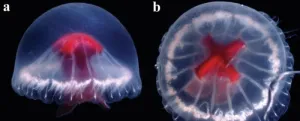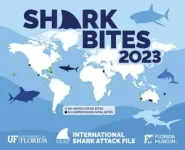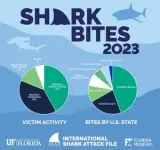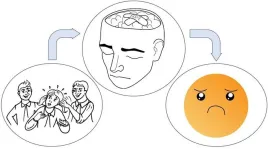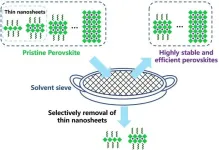(Press-News.org) A gelatinous animal with a diameter of about 10 cm and a red stomach resembling the Cross of St George when seen from above. This is Santjordia pagesi, a newly described species of medusa. Medusae are a type of free-swimming, umbrella-shaped jellyfish with a reduced stalk.
The new species is described in an article published in the journal Zootaxa. The study was conducted by an international group of researchers that included a Brazilian scientist supported by FAPESP.
The scientist in question is André Morandini, last author of the article. He is a professor of zoology at the University of São Paulo’s Institute of Biosciences (IB-USP) and Director of the Center for Marine Biology (CEBIMar) at the same university.
While he was conducting the research, Morandini was supported by FAPESP’s Research Program on Biodiversity Characterization, Conservation, Restoration and Sustainable Use (BIOTA-FAPESP) via three projects (10/50174-7, 11/50242-5 and 13/05510-7.
The other authors are researchers at the Japan Agency for Marine-Earth Science and Technology (JAMSTEC), in Japan, and the Okinawa Institute of Science and Technology (OIST), also in Japan.
The St George’s Cross Medusa, as it has been named, apparently lives only in the Sumisu Caldera in Ogasawara Islands, some 460 km south of Tokyo. The caldera is a hydrothermally active deep-sea volcanic structure with a diameter of about 10 km and a depth of 812 m.
“The species is very different from all the deep-sea medusae discovered to date. It’s relatively small, whereas others in this kind of environment are much larger. The bright red coloring of its stomach probably has to do with capturing food,” Morandini explained.
Like all jellyfish, S. pagesi is transparent, and the bright red stomach ensures that bioluminescent organisms cannot be seen by predators after they are swallowed. Bioluminescence (emission of light by living organisms) is common in the darkness of the deep sea.
The species epithet pagesi was chosen to honor Dr. Francesc Pagès, a jellyfish taxonomist from Barcelona who died recently. The authors determined that the medusa belongs to a new genus (Santjordia, St George in Catalan) and subfamily (Santjordiinae) in the jellyfish family Ulmaridae.
Rare and inaccessible
Discovery of a new species usually entails the collection of several specimens, but S. pagesi is very rare, and it was so hard to collect that the description was based on a single specimen, although the scientists did see another nearby and expect future surveys of the deep ocean to discover more members of the group.
The specimen was captured in 2002 by the Remotely Operated Vehicle (ROV) Hyperdolphin during a dive in the Sumisu Caldera, which can only be accessed by scientific expeditions with this type of special equipment. No other specimens were found until 2020, when the KM-ROV filmed, but was unable to collect, another individual of the same species.
“We opted to publish the description and call attention to the species that are present at the site, which has a substrate rich in minerals and the potential to be commercially developed. Unfortunately, research can’t be conducted in such places without partners who have interests of this kind,” Morandini said.
Because it is so different even from closely related species, the researchers believe S. pagesi may have an arsenal of venoms that are also unlike those discovered to date. “Who knows? Maybe it holds secrets more valuable than all the mineral wealth that could be extracted from that place. All this with the advantage of keeping the species and the site intact,” he stressed.
About São Paulo Research Foundation (FAPESP)
The São Paulo Research Foundation (FAPESP) is a public institution with the mission of supporting scientific research in all fields of knowledge by awarding scholarships, fellowships and grants to investigators linked with higher education and research institutions in the State of São Paulo, Brazil. FAPESP is aware that the very best research can only be done by working with the best researchers internationally. Therefore, it has established partnerships with funding agencies, higher education, private companies, and research organizations in other countries known for the quality of their research and has been encouraging scientists funded by its grants to further develop their international collaboration. You can learn more about FAPESP at www.fapesp.br/en and visit FAPESP news agency at www.agencia.fapesp.br/en to keep updated with the latest scientific breakthroughs FAPESP helps achieve through its many programs, awards and research centers. You may also subscribe to FAPESP news agency at http://agencia.fapesp.br/subscribe.
END
Brazilian researcher helps describe a novel species of jellyfish discovered in a remote location in Japan
The animal has been sighted only twice in a deep-sea volcanic structure called Sumisu Caldera, in the Ogasawara Islands. The researcher was on the team that has published a description of a rare medusa found at a depth of 812 meters.
2024-02-05
ELSE PRESS RELEASES FROM THIS DATE:
Small but mighty – study highlights the abundance and importance of the ocean’s tiniest inhabitants
2024-02-05
Tiny plankton – measuring less than 20µm (or 0.02mm) in diameter – make up the majority of plankton in the ocean and play a critical role in the planet’s health, according to new research.
However, scientists say challenges in identifying them have led to them becoming a silent majority that is currently being overlooked when it comes to global ocean policy.
The study is one of the first to explore the abundance and importance of these tiny ocean inhabitants around the UK coastline, with the technology capable of monitoring them only having been introduced in around 2010.
However, ...
Bullied teens’ brains show chemical change associated with psychosis
2024-02-05
Researchers have found that adolescents being bullied by their peers are at greater risk of the early stages of psychotic episodes and in turn experience lower levels of a key neurotransmitter in a part of the brain involved in regulating emotions. The finding suggests that this neurotransmitter — a chemical messenger that transmits nerve impulses for communication by a nerve cell — may be a potential target for pharmaceutical interventions aimed at reducing the risk of psychotic disorders.
Psychosis is a mental state characterized by loss of contact with reality, incoherent speech and behavior, and typically hallucinations and delusions seen in psychiatric disorders ...
Unlocking precision medicine for inflammatory bowel disease
2024-02-05
The prevalence of inflammatory bowel disease (IBD), encompassing ulcerative colitis (UC) and Crohn's disease (CD), is rapidly increasing worldwide, affecting an estimated 6.8 million people. This surge brings significant economic burdens, with annual healthcare costs exceeding $12,000 and $7,000 for CD and UC patients, respectively. Tailored drug selection based on individual factors can potentially reduce these costs and improve patient outcomes.
Factors associated with a Western lifestyle such as urbanization, high animal protein intake, ultra-processed foods, and reduced fiber ...
High production of polyols using crude glycerol by wild-type safe yeasts
2024-02-05
Utilizing crude glycerol for the synthesis of high-value products offers a promising solution to counter the adverse effects of declining glycerol prices in the biodiesel sector. The prevalence of crude glycerol, a by-product of biodiesel production, across agriculture, biofuel, and industrial sectors is steadily rising. Recent advancements have demonstrated the effectiveness of both wild-type and mutant yeast strains as microbial cell factories capable of converting glycerol into a diverse array of valuable compounds, including microbial oils, sugar-alcohols (polyols), and organic acids. With the projected increase in biodiesel production, there is a need to explore integrated ...
Solvent sieve method sets new record for perovskite light-emitting diodes
2024-02-05
Using a simple solvent sieve method, researchers from the Ningbo Institute of Materials Technology and Engineering (NIMTE) of the Chinese Academy of Sciences (CAS) have taken the lead in developing highly efficient and stable perovskite light-emitting diodes (PeLEDs) with record performance.
The study was published in Nature Photonics.
Perovskites are one of the most promising optoelectronic materials due to their excellent optoelectronic performance and low preparation cost. Compared with traditional organic light-emitting diodes (OLEDs), PeLEDs have a narrower light-emitting spectrum and superior color ...
Combination therapy lowers blood pressure in patients receiving ibrutinib
2024-02-05
(WASHINGTON, Feb. 5, 2024) – Combination treatments with two or more blood pressure drugs can significantly reduce blood pressure in patients taking ibrutinib, according to a new study published in Blood Advances.
Targeted drugs such as ibrutinib have improved outcomes for patients with cancers of the lymphatic system, but patients treated with ibrutinib and other drugs in its class often develop new or worsening high blood pressure (or hypertension or HTN). Few studies have examined how best to treat this potentially serious side effect, nor do any formal guidelines exist to steer doctors toward the most effective treatments.
“To ...
Ultra-sensitive lead detector could significantly improve water quality monitoring
2024-02-05
Engineers at the University of California San Diego have developed an ultra-sensitive sensor made with graphene that can detect extraordinarily low concentrations of lead ions in water. The device achieves a record limit of detection of lead down to the femtomolar range, which is one million times more sensitive than previous sensing technologies.
“With the extremely high sensitivity of our device, we ultimately hope to detect even the presence of one lead ion in a reasonable volume of water,” said Prabhakar Bandaru, a professor in the Department of Mechanical and Aerospace Engineering at the UC San Diego Jacobs School of Engineering. “Lead exposure is a serious health concern, ...
World’s largest childhood trauma study uncovers brain rewiring
2024-02-05
The world’s largest brain study of childhood trauma has revealed how it affects development and rewires vital pathways.
The University of Essex study – led by the Department of Psychology’s Dr Megan Klabunde – uncovered a disruption in neural networks involved in self-focus and problem-solving.
This means under-18s who experienced abuse will likely struggle with emotions, empathy and understanding their bodies.
Difficulties in school caused by memory, hard mental tasks and decision making may also emerge.
Dr ...
Number of shark bites consistent with recent trends, with small spike in fatalities
2024-02-05
There was an increase in the number of unprovoked shark attacks worldwide and an uptick in fatalities in 2023 compared to the previous year. The University of Florida’s International Shark Attack File (ISAF), a scientific database of global shark attacks, confirmed 69 unprovoked bites in 2023. Although this is higher than the most recent five-year average of 63 attacks, the data remain consistent with long-term trends.
Ten of the past year’s unprovoked attacks were fatal, up from five the year before, with a disproportionate number occurring in Australia. Although the country accounted for 22% of all attacks, ...
Schmidt Sciences awards $1.95M gift to Mount Sinai's Windreich Department of Artificial Intelligence and Human Health to establish The Eric and Wendy Schmidt AI in Human Health Fellowship Program
2024-02-05
New York, NY (February 5, 2024) — The Windreich Department of Artificial Intelligence (AI) and Human Health at the Icahn School of Medicine at Mount Sinai announced a transformative $1.95 million gift from Schmidt Sciences to create The Eric and Wendy Schmidt AI in Human Health Fellowship Program. The gift will support an inaugural cohort of five fellows over a three-year fellowship.
By leveraging AI and machine learning to tackle the increasing volume of data in health care, The Eric and Wendy Schmidt AI in Human Health Fellows will play a pivotal role in advancing medical research. ...
LAST 30 PRESS RELEASES:
Scientists reveal our best- and worst-case scenarios for a warming Antarctica
Cleaner fish show intelligence typical of mammals
AABNet and partners launch landmark guide on the conservation of African livestock genetic resources and sustainable breeding strategies
Produce hydrogen and oxygen simultaneously from a single atom! Achieve carbon neutrality with an 'All-in-one' single-atom water electrolysis catalyst
Sleep loss linked to higher atrial fibrillation risk in working-age adults
Visible light-driven deracemization of α-aryl ketones synergistically catalyzed by thiophenols and chiral phosphoric acid
Most AI bots lack basic safety disclosures, study finds
How competitive gaming on discord fosters social connections
CU Anschutz School of Medicine receives best ranking in NIH funding in 20 years
Mayo Clinic opens patient information office in Cayman Islands
Phonon lasers unlock ultrabroadband acoustic frequency combs
Babies with an increased likelihood of autism may struggle to settle into deep, restorative sleep, according to a new study from the University of East Anglia.
National Reactor Innovation Center opens Molten Salt Thermophysical Examination Capability at INL
International Progressive MS Alliance awards €6.9 million to three studies researching therapies to address common symptoms of progressive MS
Can your soil’s color predict its health?
Biochar nanomaterials could transform medicine, energy, and climate solutions
Turning waste into power: scientists convert discarded phone batteries and industrial lignin into high-performance sodium battery materials
PhD student maps mysterious upper atmosphere of Uranus for the first time
Idaho National Laboratory to accelerate nuclear energy deployment with NVIDIA AI through the Genesis Mission
Blood test could help guide treatment decisions in germ cell tumors
New ‘scimitar-crested’ Spinosaurus species discovered in the central Sahara
“Cyborg” pancreatic organoids can monitor the maturation of islet cells
Technique to extract concepts from AI models can help steer and monitor model outputs
Study clarifies the cancer genome in domestic cats
Crested Spinosaurus fossil was aquatic, but lived 1,000 kilometers from the Tethys Sea
MULTI-evolve: Rapid evolution of complex multi-mutant proteins
A new method to steer AI output uncovers vulnerabilities and potential improvements
Why some objects in space look like snowmen
Flickering glacial climate may have shaped early human evolution
First AHA/ACC acute pulmonary embolism guideline: prompt diagnosis and treatment are key
[Press-News.org] Brazilian researcher helps describe a novel species of jellyfish discovered in a remote location in JapanThe animal has been sighted only twice in a deep-sea volcanic structure called Sumisu Caldera, in the Ogasawara Islands. The researcher was on the team that has published a description of a rare medusa found at a depth of 812 meters.
